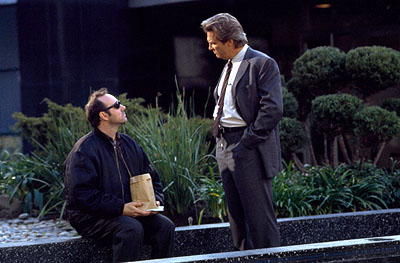

K-PAX boasts two impressive performances from Kevin Spacey and Jeff Bridges, but lacks real power in its story. Based on the novel by Gene Brewer, K-PAX deals with the relationship between psychiatrist Mark Powell (Bridges, The Contender, Simpatico) and patient Prot (Spacey, Pay It Forward, The Big Kahuna). Prot claims to be from the planet K-PAX, which Powell obviously believes is some delusion. The problem is that Prot can be extremely convincing. He has an aversion to bright light and can see outside the visible spectrum. He has knowledge that far surpasses current scientific trends, some of which he reveals and some of which he does not.
Director Iain Softley (The Wings of the Dove, Hackers) and adapter Charles Leavitt (The Jennie Project, The Mighty) take their time in moving the story forward. Nothing happens for a long time. It feels like they are setting up something that never happens. Once the plot begins to gel, Softley reveals one tidbit, then another at his own pace. Things finally begin to move near the end. Prot declares that he is going back to K-PAX, and he may take one of his fellow patients. This revelation scares Powell, who believes that Prot may harm himself. The patients are of the movie patient variety. Rather than truly sick, they are more cute and harmless.
This is a role reversal of sorts for Bridges, who played something akin to the Prot character in 1984's Starman. As the psychiatrist, Bridges has a calming presence, serving as the anchor for the movie. He is the link to reality, and Bridges' always assured performance keeps the audience grounded. Spacey has a much harder job to do. He needs to accurately portray somebody who may or may not be delusional. Spacey takes a neutral approach to the role. He does not overplay the potential psychoses of Prot. Instead, he speaks deliberately and matter-of-factly. He measures all his actions, quite possibly like an alien would. Watching the interplay between Spacey and Bridges is the best part of K-PAX.
What Softley does correctly is assume the audience has a brain. There is an ending, but it is up to each person watching to decide whether or not Prot is actually an extraterrestrial. Still, the story cannot resist the temptation to become mushy. Prot may be there for mental help, but he is the one who ends up helping everybody, including Powell who is estranged from his son. Prot's offer to take a companion to K-PAX gives all his fellow patients hope and possibly the push they need to cure themselves. Aside from the ambiguous ending, everything wraps up a little too nicely, leaving K-PAX as a whole worse off.